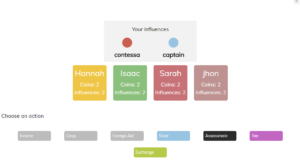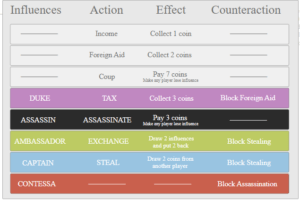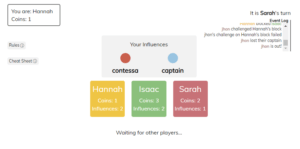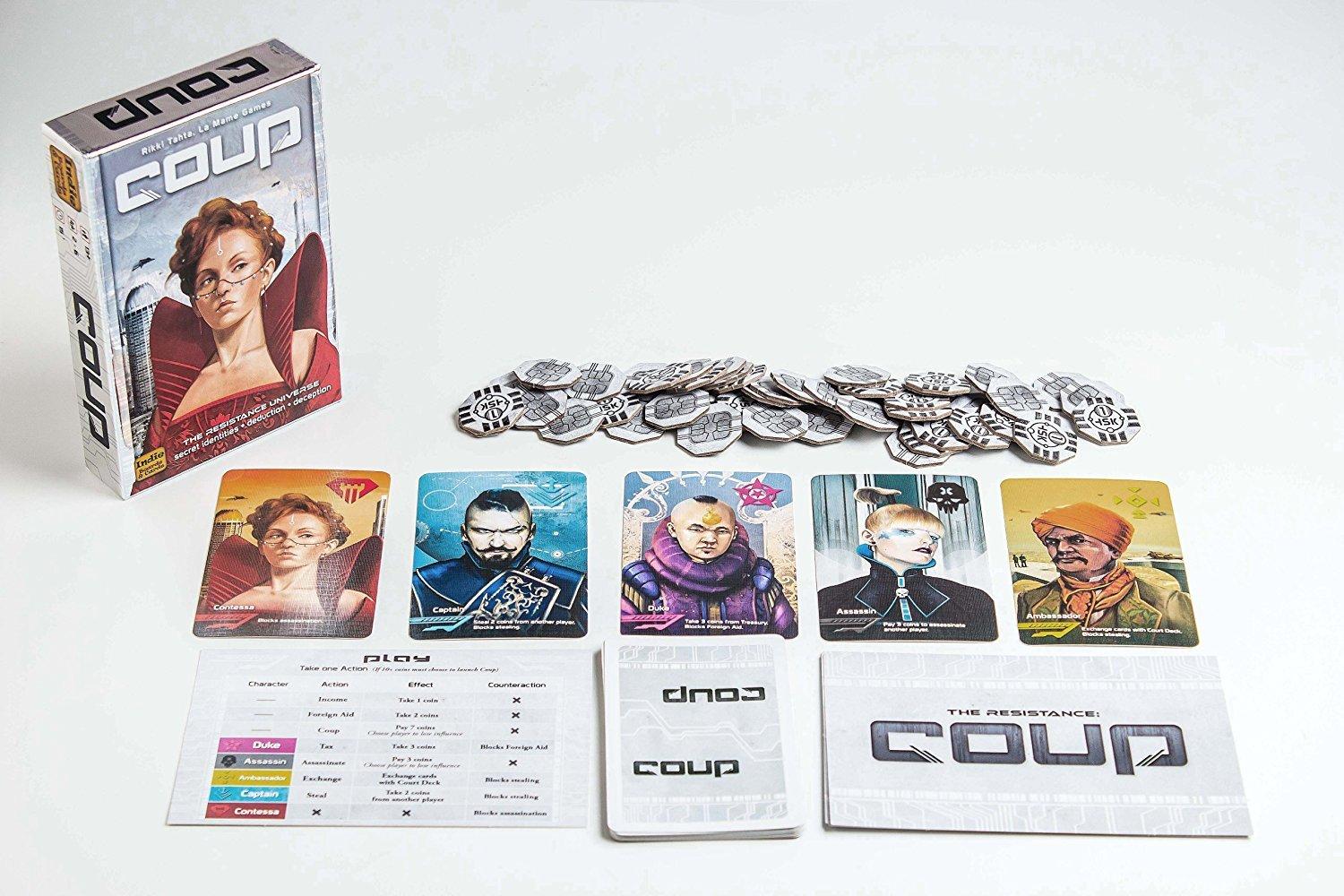Critical Play: A Competitive Analysis of Coup
Coup is a social deduction card game that utilizes role play and social deception to create engaging and intense social situations between players. This game is targeted for ages 13+ due to the somewhat complex nature of its rules, and was designed by Rikki Tahta and published in 2012 by Indie Boards & Cards and La Mame Games. Its premise is that every player has two character cards, which must not be revealed to others; these cards also award players certain abilities such as stealing from other players or even assassinating others. The main goal of this game is to survive by not revealing your two cards; there are a number of situations that force players to reveal and therefore forfeit one of their cards. The most interesting twist about this game is that players can lie about what character they have, but if they are caught, must reveal a card; similarly, if a player incorrectly calls another player’s buff, they also must reveal a card. Coup has various similarities and differences in comparison to the game my team is currently developing, called Sabotage & Spice. Sabotage & Spice is a board game where all players are cooks aiming to cook a meal to please a certain judge with certain food preferences. Players take turns picking ingredients to create their dish, and can also steal ingredients. All players are also assigned a secret mission that they can accomplish anytime throughout the game for a point bonus; other players can also try to guess a player’s secret mission to prevent them from getting extra points. Ultimately, Coup and Sabotage & Spice vary across some mechanics, but also have similarities in game aesthetic and social deduction game mechanics.
Coup and Sabotage & Spice share similarities in terms of game mechanics, and also in the aesthetics of play. One key game dynamic that is similar is the introduction of a social deception dynamic. As seen below, players can take a series of actions, regardless of their actual cards, meaning that they can lie in order to use a certain action. Other players can also call their bluff, although they face consequences for being wrong.

Sabotage & Spice has a similar dynamic of social deception, although the mechanic itself is slightly varied. Players each have a secret mission to accomplish throughout the game that can award them a significant amount of points to help them win. However, if a player is able to guess their secret mission, they can win points; however, much like Coup, they will suffer a consequence of losing points for guessing incorrectly. In both games, there exists this consequence of guessing incorrectly to maintain players having a balance between constantly guessing a player’s social deception; this mechanic helps to create fellowship by making social contexts and frameworks where players are forced to make calculated decisions as opposed to rash ones.
Furthermore, Coup utilizes sensation and narrative to create an interesting and immersive experience for users. For example as seen in the picture below, users role play as characters such as dukes, assassins, or captains, which all creates an immersive experience. Furthermore, as seen in the picture below, different characters interact with each other in unique ways as well, further creating dynamic relationships and interactions between users to build a narrative.

Our game, Sabotage and Spice, aims to integrate role play into the game to create a similar kind of sensation and narrative. For example, users all role play as cooks, who are aiming to please a judge with certain food preferences; so, they must assemble their recipe according to that judge’s preferences. As they play with ingredients, recipes, and “cooking”, we are hoping that players are able to become immersed in becoming cooks/chefs. We also hope to support dynamic interactions between players by having dynamics such as the ability to steal ingredients from other people.
Differences:
One key difference in game mechanics between Coup and Sabotage & Spice is the way the win condition is determined. As seen below in the screenshot, Coup has a coin/point system, where players can collect coins, which can be used as in-game currency to spring attacks on other players. Although it is more advantageous to have more coins, this doesn’t necessarily determine the win condition. For example, my brother Isaac, who I was playing the game with, spent many rounds just saving up coins, but in most cases, this was not as huge of a help in winning the game as he thought it would be.

As seen below, players win when they are the “last one standing”, where all other players have revealed their cards.

This kind of win condition is quite different from Sabotage & Spice. In Sabotage & Spice, the win condition is that the first player to 30 points wins. In this scenario, the “in game currency” would be these points, but in our game, this would directly translate to the win condition. Hence, the win conditions vary across Coup and our game, where Sabotage & Spice uses a direct point system, and Coup uses a “last player standing” mechanic to determine winners.
Another key difference between Sabotage & Spice and Coup is actually in the way that the social deception task is received and played out by players. In Coup, players can easily bluff in ways that are already integrated into the game, for example, players can make moves such as “steal from another player” despite not holding the card that allows them to do this. However, in Sabotage & Spice, players are each given one secret mission to carry out sometime throughout the whole game, and it may not be as seamlessly integrated into the flow of the game as it is in Coup. For example, a player’s secret mission might be to “integrate mushrooms into one dish”, but only come across ingredients that allow them to make baked goods. Since it is not normal to add mushrooms to baked goods, fulfilling this particular secret mission might be much more difficult for this player to integrate into their gameplay. Hence, in some ways, these secret missions might be more challenging to deceive other players as opposed to Coup, as players are only aware of their own cards, and that there are a total number of 3 cards per character.
Reflections
Overall, as I was playing Coup, as a game designer, it was very interesting to analyze how a few simple rules and cards could create such a complex social dynamic. One particular feature that stood out to me as I was playing was the entire trade-off of socially deceiving vs. suspecting another player of deception. In other simpler social deception games such as BS, although you do have to take all the cards in the deck if you are caught lying, this provides an advantage, in the sense that you can see all the cards that players don’t have. In Coup particularly, getting caught lying means that you become extremely close to losing; one more mistake, and you’re out! There was also this idea that there isn’t a true way to “recover” in that you cannot get another card back, and are stuck with 1 card for the rest of the game. I liked this challenging game mechanic of Coup that set it apart from other social deduction, round-based games that I have played.
Some initial critiques are the overall complexity of the rules and player dynamics in Coup. Although they were very nuanced and made for good social situations, since I and the other players I was playing with weren’t very familiar to the rules and abilities of all the players, at least initially, the game was more about us figuring out rule by rule, play by play, what was allowed, before we were able to explore the full social deduction aspect of the game. In addition, sometimes players would make uncalculated decisions and were out of the game early, but the game would keep going, forcing the person to wait a long time for the next game. Although this is how the game was designed, this kind of mechanic where players are systematically eliminated and then have no role in the game after didn’t feel very inclusive of all players. Hence, these critiques are something that I want to integrate for our first game, where we are creating a game where all players are always included, and that game rules aren’t so nuanced that they take the fun out of play.
Ultimately, Coup and Sabotage & Spice fall under a similar branch of role playing, social deduction card games, and hold various similarities and differences across game mechanics and aesthetics.




